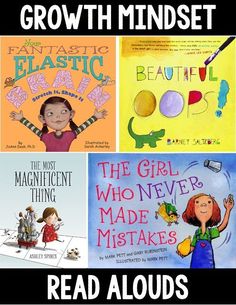Do you have children in your care that easily give up when learning a new skill? Have you noticed children who get overly frustrated if they don’t see success come easy to them? What we are really asking here is if the children have a growth or a fixed mindset. A mind set is a self-belief or a self-thought that may either be positive or negative. Our mindsets are what guide our actions, reactions and behaviors, in particular to gaining knowledge and learning new skills. A fixed mindset equals fixed intelligence. People in this mindset perceive they have no way to improve themselves. A Growth mindset equals intelligence that can be developed. People with this mindset tend to work harder because they know they can improve.
Young children naturally lean toward the growth mindset as they are curious about their environment and explore and learn through all of their senses. They learn through trial and error, and incidentally as well as through modeling and teaching. I wonder at what point do people make the shift from growth to fixed mindsets?
Carol Dweck, Lewis and Virginia Eaton professor of psychology at Stanford University and the author of Mindset: The New Psychology of Success states, “If parents want to give their children a gift, the best thing they can do is to teach their children to love challenges, be intrigued by mistakes, enjoy effort, and keep on learning.”
Here, Imagination Soup outlines Five Parenting Strategies to Develop Growth Mindset and Carol Dweck’s Study on Praise and Mindsets is outlined in this short video.
At a Childcare Providers workshop I attended recently, the presenter had studied some of Dweck’s work and shared a few “trigger words” that parents and teachers can use with children.
Trigger words that stimulate mindset:
- Praising Effort
- Accepting Failures
- Ask for Explanations
- Express the Amount of work put in
- “Your Brain is Growing”
- Praise the PROCESS!
Words that discourage:
- Praising outcome
- Criticizing Failures
- Telling kids the answers
- Labeling or Judging student/work
- Telling them they “tried their best”
- Praising the PERSON
At the same workshop, I was introduced to the “Power of Yet”…
I can’t do this….yet
This doesn’t work…yet
I’m not good at the…yet
I don’t know how to….yet
Parents and teachers can support young learners in the struggle with this encouraging little word and guided questions that can lead students beyond “I can’t.”
By developing a “growth mindset”-an attitude that allows for possibilities and promotes progress and problem solving, children improve their skills for effectively solving problems every day and in more challenging scenarios (Dweck 2006).
Key Rationale and Strategies Supporting Growth Mindset
Rationale:
- Everyone makes mistakes.
- Making mistakes give us an opportunity to do things differently and to learn.
- Practice make better.
Strategies:
- Model resilience and problem solving strategies
- Give children opportunities to solve problems on their own when appropriate
- Encourage children to ask a friend to help before seeking an adult’s assistance
Check out Preschoolers Grow Their Brains from NAEYC for examples of growth mindset in action and how to set the stage for best practices in early childhood education.
Pinterest has an endless supply of ideas and resources for teachers on creating a growth mindset classroom. And there are numerous children’s books to encourage young learners to open their minds to the power of “yet”.

Image Source: Pinterest
What are your strategies for establishing a Growth Mindset Environment in the child care setting?